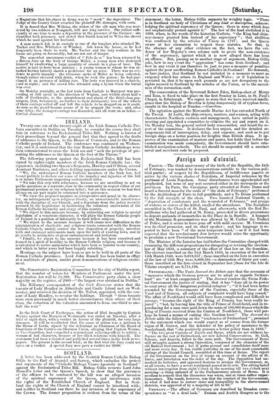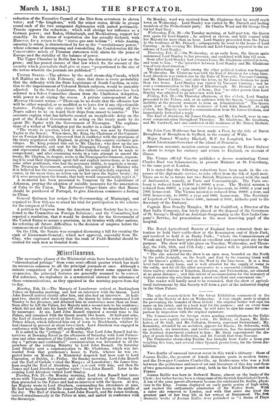,hrtigu Inch &toga'.
FRANCE. —The third anniversary of the birth of the Republic, the 24th of February, was marked by demonstrations suitable to the various poli- tical parties; of respect by the Republicans, of indifference passive or active by the various shades of Royalists, of Imperial reticence by the partisans of Louis Napoleon. Some disturbances were apprehended and prophesied, but none of any sort occurred either in the metropolis or the provinces. In Paris, the Cavaignae party attended at Notre Dame and heard a funeral mass for the souls of "the slain of February," performed by the Archbishop of Paris in full pontificals, and a Te Deum performed by the full strength of the choir. Two hundred National Guards, a " deputation of combatants and the wounded of February," and groups of widows or sisters of the killed, swelled the attendance. The Socialists assembled in the Church of St. Paul, and afterwards, with the Red Re- publicans who had gathered at St. Remy, proceeded in divers processions to deposit garlands of immortelles in the Place de la Bastille. A banquet of -the Mountain Representatives was allowed by M. earlier the Prefect of Police, and it seems to have gone off with mild success: M. Cremieux was its chief promoter, and its chief speaker ; and his language is re- ported to have been "of the most temperate kind,"—as if it had been expected that the revolutionary Jew lawyer would seize the opportunity to proclaim a new Provisional Government.
The Minister of the Interior has laid before the Committee charged with examining the different propositions for abrogating or revising the election- law of May 1850, a summary of the effect of that law on the franchise. The electors inscribed on the 31st March 1850, in execution of the law of 15th March 1849, were 9,618,057; those inscribed on the lists in execution of the law of 15th May were 6,809,281—a diminution of thirty per cent ; those inscribed on the lists closed in September last (those for the Isle de Vilaine excepted) are 6,711,186.
SWITZEILLAND.—The Paris Journal des Dohats says that the accounts of "measures which the German powers are to adopt as regards Switzer- land" are "at least exaggerated." The Journal renders the Swiss Fede- ral Government the justice of stating, that it has "done all in its power to send away all the dangerous political refugees " ; "if it had been better seconded by the Governments of the Canton; especially those of the Vaud and of Geneva, all subjects of complaint would have long ceased." The affair of Neufchatel would still have been complicated and difficult to arrange, "because the right of the King of Prussia has been really in- jured", "but, by leaving him the title of Prince of Neufchatel, and in re- purchasing for a sum once paid down the rente of 100,000 francs which the King of Prussia received from the Canton of Neufchatel, there will per- haps be found a means of cutting this Gordian knot." The Journal des Dards adds the following on the "tendencies of Switzerland " ; premised by the statement which one would expect as of course from the former organ of M. Guizot, and the defender of his policy of assistance to the Sonderbund, that "she positively pursues a better policy than in 1846." "The two great Cantons of Zurich and Berne, which are not without in- fluence on the rest of Switzerland, are now Liberal Conservatives. St. Gall, Soleure, and Arg,ovia, follow in the same path. The Government of Berne still struggles against a strong Opposition, composed of the elements of the old Radical Government ; but it gains ground and consolidates itself more and more every day. It was visible yesterday in one of the most remarkable sittings of the Grand Council, assembled at this time at Berne. The report of the Government on the levy of troops on account of the affairs of St. Imier, and Interlaken was the order of the day. The Opposition had un- masked its batteries, and appeared desirous to arraign the Government, or at all events, to have a severe reprimand passed on its acts. The sitting lasted without interruption from eight o'clock in the morning till two o'clock next morning—a thing unheard of in the Parliamentary annali of Berne. It is needless to remark that the discussion was warm, and at times rather unpar- hamentary. The result, however, was that the conduct of the Government, in what it had done to restore order and tranquillity in the above-named districts, was approved of by a majority of 111 to 93."
GERMANY.—The affairs of Germany are described by Dresden corre- spondence as "at a dead lock!' Prussia and Austria disagree as to the
reduction of the Executive Council of the Diet from seventeen to eleven Totes; and "the kingdoms," with the minor states, divide in groups round each of the two antagonist diplomacies with united pertinacity. Prussia opposes the reduction ; which will abridge her influence as a -German power ; and Baden, Oldenburgh, and Mecklenburg, support her stanchly, In the stress of negotiation she has actually declared, with Hanover, for a return to the "status quo ante helium " ; while Austria, amusing to relate, is characterized by her as the "revolutionary power," -whose schemes of decomposing and remodelling the Confederation fill the -Conservative minds of Prussian statesmen with alarm for the peace of Europe and the stability of the balance of power. The Upper Chamber at Berlin has begun the discussion of a law on the press ; and has passed clauses of that law which fix the amount of the security which journalists shall give at sums "proportioned to the size of the towns wherein the journals are published"!
UNITED STATES. —The advices by the mail steam-ship Canada, which Left Halifax on the 13th February, state that there is every probability that the difficulty with the State Legislature of South Carolina, in rela- tion to the imprisonment of Coloured British subjects, would be amicably adjusted. In the State Legislature, the entire correspondence has been referred to a Select Committee chosen from the Charleston delegation, with power to sit during the recess. A private correspondent of the _Morning Chronicle writes—" There can be no doubt that the offensive law will be either repealed, or so modified as to leave few if any objectionable features. Perhaps the only clause left will be one requiring all free Negro sailors to be on board their ships from sunset to sunrise." The Accounts explain what has hitherto seemed an inexplicable delay on the part of the Federal Government in acting on the treaty made by its -agent Mr. Squier with the Government of Nicaragua. The explana- tions of a writer at Washington put the matter in a clear light— "The treaty in question, when it arrived here, was sent by President Taylor to the Senate, When there, Mr. King, the Chairman of the Commit- tee on Foreign Relations, discovered that it conflicted with the provisions of the treaty negotiated with England, in giving to this country exclusive pri- vileges. Mr. King pointed this out to Mr. Clayton ; who drew up the ne- .cessary amendments, and sent for the Nicaragua Charge, Senor Corachee, -and represented the difficulty ; but Seiler Corachee could not be made to -comprekend; and after consuming weeks in a vain attempt to amend the -treaty, Mr. Clayton, in despair, wrote to the Niearagua Government, request- ing it to send their diplomatic agent full and explicit instructions, or to send some other gentleman, who had the necessary ability, to negotiate a treaty. The Nicaragua Government, accordingly, have appointed a Minister who it is believed has the necessary powers, and his arrival is daily expected. Of -course, in the mean time, no action can be had upon the Squier treaty ; for if it were pressed upon the Senate, that body would unquestionably reject it." A memorial has been presented to Congress by the Legislature of Arkansas, praying the adoption of suitable measures for the annexation -of Cuba to the Union. The Baltimore Clipper hints also that Maca.o should be purchased of Portugal, to give American commerce a footing in China.
General Quitman has resigned the Governorship of Mississippi, and repaired to New Orleans to stand his trial for participation in the scheme for the conquest of Cuba.
A petition-to Congress from the American Peace Society has been re- .fared to the Committee on Foreign Relations; and the Committee] had -reported a resolution, that it would be desirable for the Government of the United States to secure a provision, in its treaties with other nations, for referring all future difficulties to the decision of umpires before the -commencement of hostilities.
On the 12th, the Senate was occupied discussing a bill for creating the rank of Lieutenant-General ; which met approval, especially from Mr. -Clay, who expressed anxiety that the rank of Field-Marshal should be -created for such men as General Scott.



























 Previous page
Previous page